tijd
in
puppet_djt
Гвозди и загвоздки
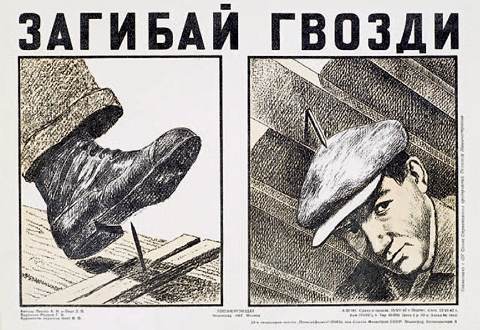
Еврейское народное сказание времен Первой мировой войны: "Когда прогремели первые выстрелы и появились первые жертвы‚ собрался Небесный суд‚ чтобы решить‚ на чьей стороне будет победа. Ангел-хранитель России положил на чашу весов все пушки и все снаряды немцев‚ чтобы показать‚ как много они наготовили для погибели невинных людей. В ответ на это ангел-хранитель Германии положил на другую чашу весов всего-навсего два гвоздя‚ два гвоздя с Кишиневского погрома‚ которые вбивали в головы жертв. И чаша с гвоздями перевесила".
https://felixkandel.org/index.php/books/522.html
Насупив густые брови, Тихонов глухим, суровым голосом прочитал свою знаменитую «Балладу о гвоздях». Все собравшиеся в зале слушали его затаив дыхание, боясь проронить слово. Баллада эта, как известно, кончается такими двумя строчками:
Гвозди б делать из этих людей:
Крепче не было б в мире гвоздей.
Эти строки всегда приводили меня в недоумение. Я не мог понять, как можно сказать людям в похвалу, что из них вышли бы хорошие гвозди. Но всю свою жизнь я со своим недоумением оставался почти в одиночестве, и тогда, в Эрмитаже, «Баллада о гвоздях» имела у слушателей необычайный успех. Тихонова выслушали с восторженным вниманием, и это произвело на Мак-Кея большое впечатление. Он попросил меня перевести ему прочитанное стихотворение.
Я принялся переводить. Тихонов медленно произносил строку, и я повторял ее по-английски. Так я довольно лихо одолевал строку за строкой, пока не дошел до роковых гвоздей.
Я забыл, как «гвоздь» по-английски. Разумеется, я с детства знал, что «гвоздь» по-английски - «nail», но в эту минуту - забыл. Бывает же такое! Безусловно, тут сработал выпитый утром коньяк; впрочем, мне и без коньяка случалось забывать хорошо известное нужное слово именно потому, что оно - нужное. Если бы не сотни глаз, следившие за мной, я, может быть, подумал бы и вспомнил. Но тут, дойдя до строчки «Гвозди б делать из этих людей» и чувствуя, что все смотрят на меня и ждут, я запнулся, обливаясь потом. Что делать из людей? Мак-Кей начал уже подсказывать мне свои догадки - совершенно невероятные. Да и как он мог догадаться, что из людей следует делать гвозди? Я нервно оглядывал стены, надеясь, что где-нибудь торчит гвоздь и я покажу его Мак-Кею. Но в стенах эрмитажных зал гвозди не торчат. И вдруг мне пришло в голову - ведь картины висят на гвоздях. Там, позади «Данаи», из стены, вероятно, торчит гвоздь, на котором она закреплена. И я постарался объяснить это Мак-Кею, тыча в «Данаю» указательным пальцем.
Я тыкал в сторону картины пальцем и все попадал в разные места нагой Данаи, и, в зависимости от моих попаданий, Мак-Кей строил вслух все новые и новые предположения о том, что именно надлежит «делать из этих людей»…
http://www.chukfamily.ru/nikolai/prosa-nchukovskiy/memories/poet-s-ostrova-yamajka

Поэт из Ямайки Клод Маккей, который так и не узнал, из чего следует делать людей, прогремел в 1919 сонетом “If We Must Die”, посвящённым расистским погромам в Америке 1919 года (Red Summer).
If we must die, let it not be like hogs
Hunted and penned in an inglorious spot,
While round us bark the mad and hungry dogs,
Making their mock at our accursèd lot.
If we must die, O let us nobly die,
So that our precious blood may not be shed
In vain; then even the monsters we defy
Shall be constrained to honor us though dead!
O kinsmen! we must meet the common foe!
Though far outnumbered let us show us brave,
And for their thousand blows deal one death-blow!
What though before us lies the open grave?
Like men we'll face the murderous, cowardly pack,
Pressed to the wall, dying, but fighting back!
https://allpoetry.com/If-We-Must-Die
В сознании чёрных американцев эти стихи занимают примерно такое же место, как поэма Бялика про Кишинёв - в сознании евреев.
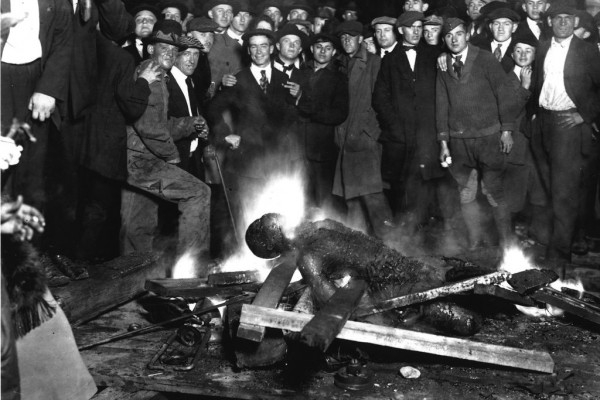
Если Маккей пишет про заклание кабанов (let it not be like hogs), то в еврейской традиции принято говорить про заклание ягнят (כצאן לטבח).
In December 1903, Hanukkah was celebrated by Ha-zeman, another journal published in St. Petersburg. Just a few months earlier, Ha-zeman had been the first Hebrew journal to report the news about the Kishinev pogrom. It was also privileged to publish Bialik’s haunting epic elegy (kinah), in which the pogrom was lamented, though not without a harsh critique of its victims for their exilic powerlessness and passivity, judged as typical products of the Jewish diaspora. The critique was carried out via a parody of the language of Jewish martyrdom: saintly Jewish martyrs (kedoshim), sanctified for generations through the image ke-tson tivhah, were now mockingly called “calves to be
slaughtered” (‘eglei ha-tivhah).
We should not be surprised then that in a dramatic story titled “In the Days of Mattathias,” published by Ha-zeman for Hanukkah of 1903, the recent Kishinev catastrophe reverberates in the words of the “aged yet youthful-looking” patriarch, again harshly critiquing past and present weakness through the familiar image:
"Our brethren, said Mattathias. . . . We are as sheep to slaughter; the impure Hellenes defiled our temple and we did not try to defend ourselves against the cruel enemy. This is our sin. If we must die, it behooves us [tov ve-yafeh lanu] to fall in battle while defending ourselves, sword in hand, rather than stretching our neck, as a dumb ewe, to every sword hovering over our faces. Let us die with our enemies!"
https://library.osu.edu/projects/hebrew-lexicon//02731-files/02731509.pdf

Маккей проникся наивной симпатией к большевикам и в 1922 приехал на полгода в СССР, опубликовав там книжку "Негры в Америке".
When Claude McKay wrote in September 1919: “Every Negro … should make a study of Bolshevism and explain its meaning to the coloured masses. It is the greatest and most scientific idea afloat in the world today … Bolshevism has made Russia safe for the Jew … it might make these United States safe for the Negro …” he was responding to the Bolshevik promise of a world free of racism and class domination, a promise that resonated far and wide, reaching a truly multiethnic global audience. But just as McKay put pen to paper, pogroms stormed through the former Pale of Settlement. The actuality ran counter to the promise.
https://www.jacobinmag.com/2020/06/antisemitism-russian-revolution-bolsheviks-pogroms
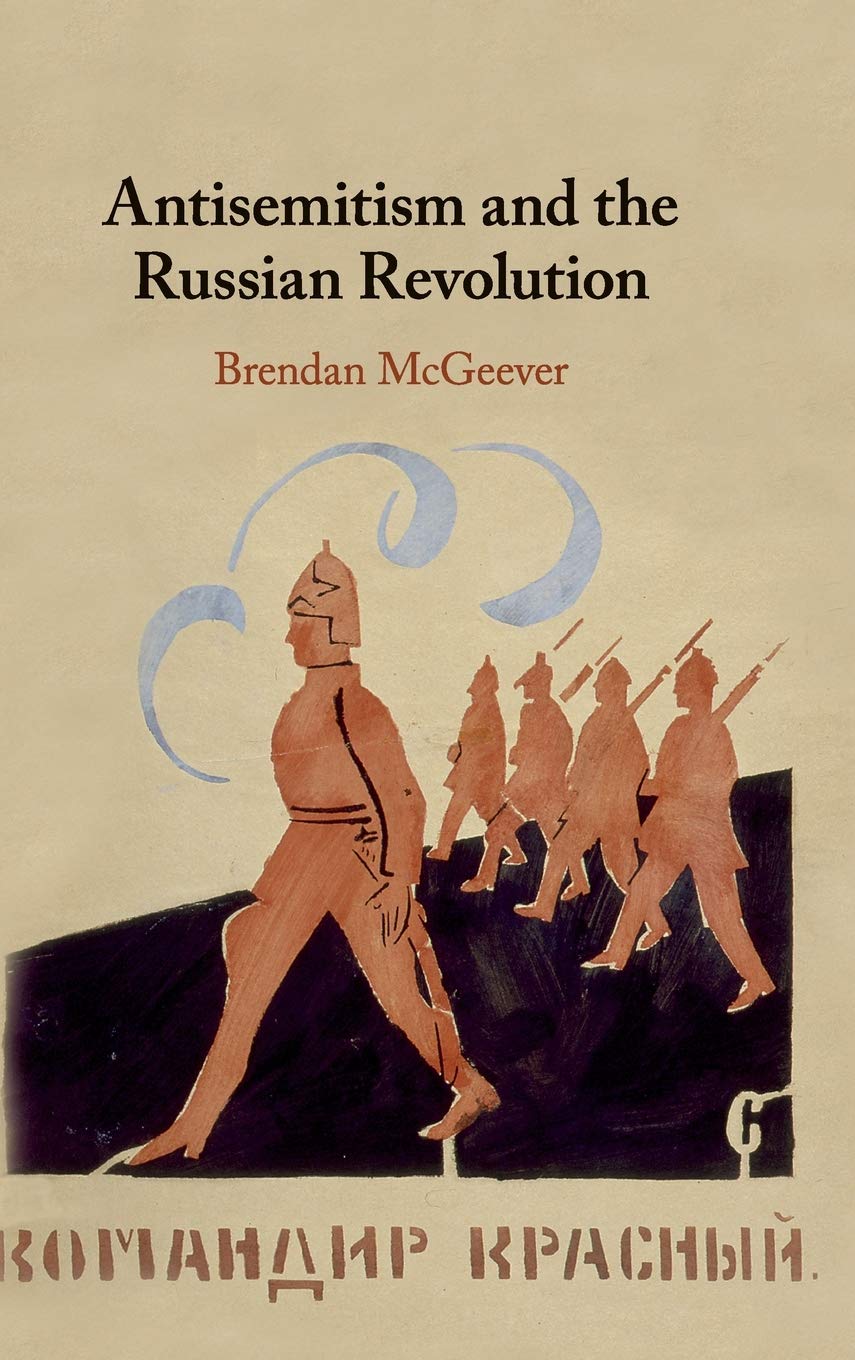
Переходя из рук в руки, бывшая Черта оседлости испытала еврейские погромы со всех сторон - поляков, петлюровцев, деникинцев, буденовцев... Для поставленных перед выбором советская власть казалась меньшим из зол.
The Bolshevik leadership espoused anti-racist, universalist, liberationist values. But rather than ideals and ideology, it was the terrible pogroms of 1918-22 that drew Jews to the Bolshevik cause-as Jews.
McGeever writes that “left-wing currents of the Jewish socialist movement moved towards Bolshevism in the full knowledge that the Red Army was pervaded by antisemitism. That many shtetl Jews followed them speaks volumes about the starkness of the choice facing Russian and Ukrainian Jews in 1919. The Bolsheviks’ anti-racist ‘promise,’ despite the unevenness of its delivery, presented the best chance of survival in the face of ferocious antisemitism of the White Army and various Ukrainian nationalist insurgence movements.”
https://www.tabletmag.com/sections/community/articles/bolsheviks-and-bundists

Тема антисемитизма обогатилась в 1919 двумя креативами.
От вождя мирового пролетариата:
"Царская полиция в союзе с помещиками и капиталистами устраивала еврейские погромы. Hенависть измученных нуждой рабочих и крестьян помещики и капиталисты старались направить на евреев. И в других странах приходится видеть нередко, что капиталисты разжигают вражду к евреям, чтобы засорить глаза рабочего, чтобы отвлечь их взоры от настоящего врага трудящихся - от капитала. Вражда к евреям держится прочно только там, где кабала помещиков и капиталистов создала беспросветную темноту рабочих и крестьян.
Только совсем тёмные, совсем забитые люди могут верить лжи и клевете, распространяемой против евреев. Это - остатки старого крепостного времени, когда попы заставляли сжигать еретиков на кострах, когда существовало рабство крестьян, когда народ был задавлен и безгласен. Эта старая крепостническая темнота проходит. Hарод становится зрячим."
https://ru.wikisource.org/wiki/%D0%9E_%D0%BF%D0%BE%D0%B3%D1%80%D0%BE%D0%BC%D0%BD%D0%BE%D0%B9_%D1%82%D1%80%D0%B0%D0%B2%D0%BB%D0%B5_%D0%B5%D0%B2%D1%80%D0%B5%D0%B5%D0%B2_(%D0%9B%D0%B5%D0%BD%D0%B8%D0%BD)
От неизвестного ветерана Первой мировой:
"Everything men strive after as a higher goal, be it religion, socialism, democracy, is to the Jew only means to an end, the way to satisfy his lust for gold and domination.
In his effects and consequences he is like a racial tuberculosis of the nations.
The deduction from all this is the following: an antisemitism based on purely emotional grounds will find its ultimate expression in the form of the pogrom. An antisemitism based on reason, however, must lead to systematic legal combating and elimination of the privileges of the Jews, that which distinguishes the Jews from the other aliens who live among us (an Aliens Law). The ultimate objective [of such legislation] must, however, be the irrevocable removal of the Jews in general.
For both these ends a government of national strength, not of national weakness, is necessary. <...>
Respectfully,
Adolf Hitler"
https://www.jewishvirtuallibrary.org/adolf-hitler-s-first-anti-semitic-writing

Приехав в Германию в 1919, генерал кавалерии Василий Бискупский возглавляет Западно-русское правительство в Берлине. Вскоре он переедет в Мюнхен, где месте с Алфредом Розенбергом, Фёдором Винбергом, Борисом Бразолем и другими деятелями участвует в группе Aufbau Vereinigung. Мечтая о свержении "жидобольшевиков" и восстановлении монархии, заговорщики переносят семена апокалиптического антисемитизма на немецкую почву. Им доведется познакомить будущего фюрера с "Протоколами сионских мудрецов" и способствать его окончательной радикализации. Представление о пользе погромов и вирус параноидального видения связи банкиров с большевизмом через тайный заговор по захвату господства над миром находят нужного носителя.
Henri Rollin wrote a ground-breaking work addressing this topic in 1939 that German forces promptly destroyed when they occupied Paris, L’Apocalypse de Notre Temps (The Apocalypse of Our Time). In his book, Rollin asserted that “Hitlerism” was a form of “anti-Soviet counter-revolution, and he analyzed the “myth of a mysterious Jewish-Masonic-Bolshevistic plot that constitutes the fundamental argument of German propaganda around the world.” Rollin investigated the Nazi belief, taken largely from the Protocols of the Elders of Zion, that a vast Jewish-Masonic conspiracy had provoked the First World War, toppled the Russian, German, and Austro-Hungarian dynasties, and unleashed Bolshevism after setting the stage by disseminating liberal ideas. <...>
Not only did many White émigrés weave notions of a Jewish world-conspiracy together with notions of an approaching apocalypse, it seems likely that, as Rollin claimed sixty years ago, White émigrés in general, while appalled by Bolshevik practices, were also influenced by them. Rollin has asserted that Rosenberg, Vinberg, and Scheubner-Richter, in particular, were astounded at the success that Lenin, himself a relatively unknown émigré, achieved through mass propaganda and the ruthless destruction of adversaries after seizing control of the state, and they hoped to fight fire with fire by using Lenin’s own methods to defeat him. While the precise degree of White émigré influence on Nazism cannot be established beyond all doubt, even a cursory examination of Hitler’s writings yields a compelling case for substantial White émigré contributions to Hitlerian ideology.
http://www.sscnet.ucla.edu/soc/groups/scr/kellogg.pdf
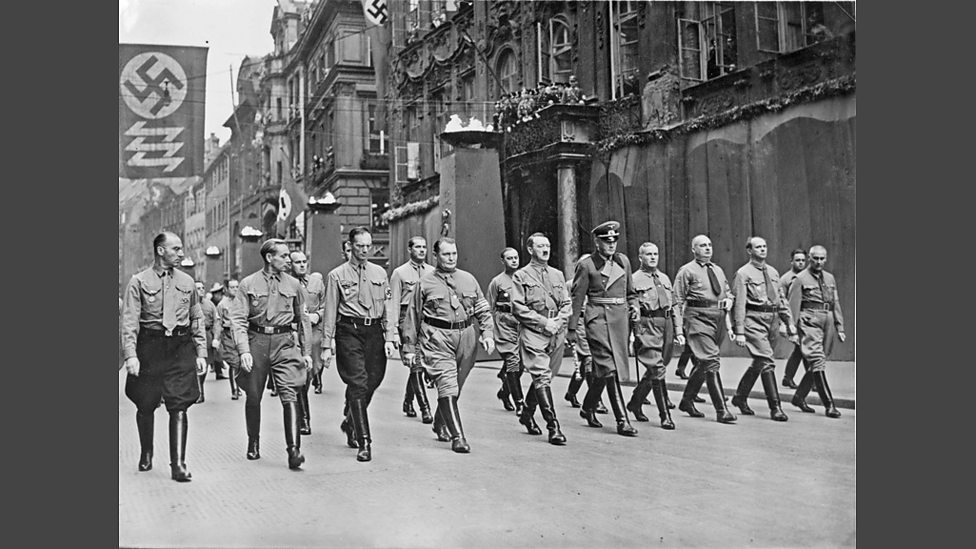
Плодотворное сотрудничество могло бы продолжиться и дальше, если бы лидер Aufbau Vereinigung Макс Эрвин фон Шойбнер-Рихтер (на снимке крайний слева) не погиб под полицейскими пулями во время "пивного путча".
On 9 November 1923, Scheubner-Richter, walking arm-in-arm with Hitler, was shot in the lungs and died instantly as he and others marched toward armed guards during the Putsch. Hitler was brought down and his right shoulder was dislocated as Scheubner-Richter's body fell after being shot dead.
Scheubner-Richter was the only "first-tier" Nazi leader to die during the Beer Hall Putsch, and of all the early party members who died in the Putsch, Hitler claimed Scheubner-Richter to be the only "irreplaceable loss". The first part of Hitler's book, Mein Kampf, is dedicated to Scheubner-Richter and the other fifteen men who died in the Putsch. The Aufbau Vereinigung declined rapidly after Scheubner-Richter's death, and its increasing integration with the NSDAP saw most of its Russian membership abandon the organization over the growing notions of anti-Slavism and Lebensraum.
https://en.wikipedia.org/wiki/Max_Erwin_von_Scheubner-Richter
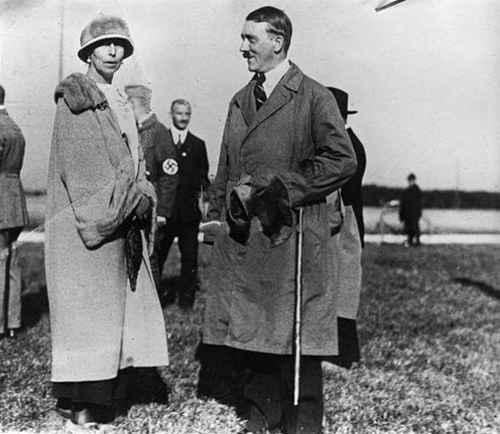
One of the surviving pieces of evidence of Hitler’s secret Russian contacts is a September 1923 photograph. It depicts Hitler chatting and smiling with none other than Grand Duchess Victoria Feodorovna of Russia. Less than six weeks later, on the night of Hitler’s attempted coup d’état, Victoria - the wife of Grand Duke Kirill Romanov, one of the pretenders to the Russian throne - stayed at the house of Hitler’s chief foreign policy adviser, Max Erwin von Scheubner-Richter.
Earlier that year, Hitler met with Nikolai Snessarev, one of the aides to Kirill Romanov and a former member of the Saint Petersburg City Duma. Snessarev believed, as he put it in his 1923 book “Die Zwangsjacke” (“The Straight Jacket”), “Fascism offers the first realistic possibility for European civilization to save itself from its imminent downfall.” Grand Duke Kirill himself, meanwhile, secretly supported Hitler with large sums of money.
On the few occasions that historians have taken Hitler’s Russian contacts seriously, they have tended to raise the question as to whether National Socialism had Russian roots. Yet the real meaning of Hitler’s secret Russian collusion lies somewhere else.
Snessarev’s book provides vital clues as to why Hitler and Russian nationalists were eager to work together. Kirill’s aide wrote that only an alliance between Germany and Russia could rescue Europe: “Unified Germany, and unified Russia. Is this not the beginning of a realization of the greatest and most humane dream of our time - the unification of the two youngest, but also the most vital peoples of the old world?”
Germany’s future dictator agreed. Ever since the moment of Hitler’s sudden politicization and radicalization in 1919, he had sought to understand how Germany could be put on equal footing with the Anglo-American world. The ratification of the Versailles Treaty, the punitive peace accord that brought World War I to an end, had been the moment of Hitler’s political epiphany, as it was only then that a realization of defeat in the war set in.
In the moment of his political awakening, he set himself two questions: How could Germany have lost the war? More importantly, how would Germany have to be recast to survive in a rapidly changing world dominated by a small number of super powers?
His answers would guide him until the day he died in the ruins of Berlin in 1945: Germany’s chief domestic weakness stemmed from the supposedly pernicious and lethal influence of the Jews, and its chief external weakness was insufficient territory, manpower and resources.
Initially, Hitler simply did not believe that Germany would be able to overcome the sources of its external weakness on its own, which made Snessarev’s ideas so attractive to him. Germany, Hitler concluded, could only survive and compete with the Anglo-American world if it entered into a permanent and all-encompassing alliance with a restored Tsarist Russia.
This realization brought him into the fold of Tsarist exiles living in Bavaria, who - just like Hitler - believed that on their own they would not be able to rise from the ashes. It was Hitler, not Russia, who eventually ended the collusion.
https://www.washingtonpost.com/news/made-by-history/wp/2017/12/01/what-russian-collusion-with-hitler-reveals-about-interference-in-the-2016-election/

1919 год был временем неопределенности и шатания устоев. Гражданская война в бывшей восточной империи, Версальский договор в Европе. Всемирная слава Альберта Эйнштейан после подтверждения британскими астрономами общей теории относительности во время солнечного затмения. В США принимают сухой закон и допускают женщин на выборы. Расовые погромы, взрывы анархических бомб, депортационные рейды, возникновение ФБР и ACLU. Третья волна пандемии гриппа "испанки" уносит жизни 200 тысяч американцев. Подспудно качели насилия заносят в мировую ноосферу иной вирус, который продолжит заражать умы больше 100 лет.

Гвозди из Кишинева в итоге вернулись в Бобруйск.
"Бобруйск был занят немцами 28 июня 1941 года. Десятки тысяч евреев не успели уйти. Не успели потому, что наша родная советская власть не посчитала нужным сказать правду, предупредить людей…
Мои родители и я, а также моя сестра и брат оказались в гетто.
7 ноября была проведена самая страшная акция: десятки тысяч евреев были расстреляны в деревне Каменка… На моих глазах убиты мои родные. Мне чудом удалось спастись перед самым расстрелом.
Я никогда не забуду те дни. И никогда не изгладится из моей памяти смерть нашего раввина Беспалова. Фашисты хотели унизить его, поставить на колени. Но он не встал, а призвал евреев мужественно принять смерть и бросил в лицо убийцам: «Вы проиграли войну, ибо льете кровь невинных. Б-г такое не прощает!» Гестаповцы приказали своим прихвостням казнить раввина. Среди полицаев из местных нашелся палач, который стал вбивать раввину гвозди в голову, пока тот не рухнул на землю…"
https://lechaim.ru/ARHIV/178/bobr.htm